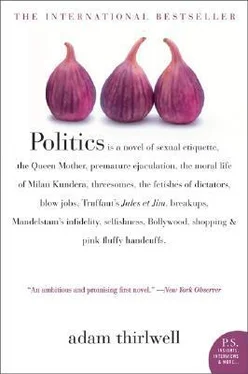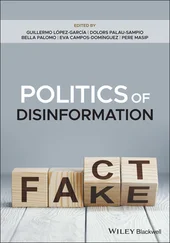Adam Thirlwell - Politics
Здесь есть возможность читать онлайн «Adam Thirlwell - Politics» весь текст электронной книги совершенно бесплатно (целиком полную версию без сокращений). В некоторых случаях можно слушать аудио, скачать через торрент в формате fb2 и присутствует краткое содержание. Год выпуска: 2004, Издательство: Harper Perennial, Жанр: Современная проза, на английском языке. Описание произведения, (предисловие) а так же отзывы посетителей доступны на портале библиотеки ЛибКат.
- Название:Politics
- Автор:
- Издательство:Harper Perennial
- Жанр:
- Год:2004
- ISBN:нет данных
- Рейтинг книги:3 / 5. Голосов: 1
-
Избранное:Добавить в избранное
- Отзывы:
-
Ваша оценка:
- 60
- 1
- 2
- 3
- 4
- 5
Politics: краткое содержание, описание и аннотация
Предлагаем к чтению аннотацию, описание, краткое содержание или предисловие (зависит от того, что написал сам автор книги «Politics»). Если вы не нашли необходимую информацию о книге — напишите в комментариях, мы постараемся отыскать её.
Moshe loves Nana. But love can be difficult — especially if you want to be kind. And Moshe and Nana want to be kind to someone else.
They want to be kind to their best friend, Anjali.
Politics
Politics — читать онлайн бесплатно полную книгу (весь текст) целиком
Ниже представлен текст книги, разбитый по страницам. Система сохранения места последней прочитанной страницы, позволяет с удобством читать онлайн бесплатно книгу «Politics», без необходимости каждый раз заново искать на чём Вы остановились. Поставьте закладку, и сможете в любой момент перейти на страницу, на которой закончили чтение.
Интервал:
Закладка:
This might seem mean of her but it wasn’t. Some people are beauties all the time and all people can be beauties sometimes but Moshe was something special. He was a cameo actor. This was partly because of his smallish five- foot-seven frame, and the gentle dip of his belly. It was mainly because of his comically mobile fleshy face and big brown unequal eyes. He was the sketchy one, the sardonic one, the oddball cool. Self-conscious of his uncared-for teeth, Moshe would faintly chew on the right-hand side of his lower lip. This made him somehow charming. It gave him a shy allure.
Moshe was not pretty, but he was charming. He had a playful grace.
3
It is often ordinary, even banal, when people meet their lover for the first time. Some people find this difficult. It is often too banal. This is especially difficult for people who believe in grandiose things like predestination and fate and twin souls.
It was, for instance, difficult for Nadezhda Mandelstam. Nadezhda was the wife of the Soviet poet Osip Mandelstam, who died in the Gulag. Nadezhda believed in grandiose things. She believed in predestination. This is how she described Osip. ‘He never had any doubt of his predestination and accepted it just as simply as he did his subsequent fate.’
I am going to digress from this digression just for a moment.
What a lie! ‘He never had any doubt of his predestination and accepted it just as simply as he did his subsequent fate.’ I think this is immoral. Nadezhda is implying that Osip accepted that death in the Gulag was his fate. He was, she is saying, poetically happy to die in the Gulag. No, I do not understand this kind of posturing. It would be difficult,
I think, being Nadezhda’s husband. It would be difficult to eat some pasta in peace. It would always be predestined pasta.
Anyway. In the first volume of her autobiography and memoir of her husband, Hope Abandoned, Nadezhda described how she met the great romantic poet Osip Mandelstam.
In the evenings, we gathered in the Junk Shop, a nightclub for artists, writers, actors and musicians. It was in a cellar of the city’s main hotel, which was being used to accommodate some officials of the second or third rank from Kharkov. M. had managed to get a place on the train that brought them, and so he was also put up, by mistake, in a very nice room in the same hotel. On the first evening he came down to the Junk Shop, and we at once took up with each other as though it were the most natural thing in the world. We always dated our life together from i May 1919, though we were forced to live apart for a year and a half after this.
If you redescribe this passage, you can get at the real story. It goes something like this. Osip turned up by accident. He wandered into his hotel bar and chatted to a few girls. He quite liked one of them. He didn’t see this girl for a year or two and forgot all about her. When he bumped into her again, she didn’t remember him. He had to remind her. They both indulged themselves and told each other it must have been fate that they had found each other again.
Now, none of my characters was this romantic. But they were, like everyone, a little romantic. So it seemed sad, they thought, that the first meeting was so ordinary. It seemed sad that they did not fall in love.
4
Papa smiled a winning smile. He questioned Moshe on the history of Prince Kropotkin. This might seem very learned. It might seem that Papa knew the historical background to Oscar Wilde’s Vera, or the Nihilists, a play about Russian anarchism. But it was not learned. It only showed that Papa had read the programme notes.
Papa marvelled at the wonders he had discovered in Moshe’s interpretation of the role of Prince Paul Maraloffski.
Moshe looked down, being modest, at Papa’s twotone shoes, their textured curves of cloth and leather.
‘Oh yeah,’ said Moshe. ‘It took ages for that scene to find.’
But was Moshe, truly, being modest? No, he was not. There was reddish eczema on the tips and backs of Moshe’s fingers, which he concealed by clumping and arranging them. He made his hands invisible behind his back. And this limited his possible, prideful gestures. That was why Moshe was standing there, his head bowed forward a little, the hands tight behind his back — acknowledging his fundraiser’s finesse.
Papa admired the gravitas, he admired the obvious savoir-faire in such a noble pose.
Moshe was a tired professional. He was tired of being backstage. The dowdiness depressed him. And I can understand that. Fake finery is depressing. But there was another reason why Moshe felt mildly depressed. No member of the royal family was present.
The royal family?
Recently, one Saturday morning, Moshe had narrated Benjamin Britten’s The Young Person’s Guide to the Orchestra, at the Barbican Hall. This performance had been attended by the Queen Mother. And Moshe liked meeting Her Majesty. He liked meeting her a lot.
First, backstage, the performers lined themselves up in a horseshoe. Moshe, the novice, drifted to one tip of it. From the corridor, he could hear the Queen Mother’s voice, chatting away. Well, he assumed it was the Queen Mother’s voice. It was nasal. It was aristocratic. Then finally she arrived.
Moshe was nearest to the door. This was a catastrophe. It meant that Moshe was the first to be introduced to the Queen Mother. Untrained in regal etiquette, Moshe had planned on copying someone else. He had especially planned on looking out for the first violin. The first violin was wearing a dress shirt with a quilted pleated and ruffled front. Everyone else was wearing an ordinary MS white shirt. The first violin, thought Moshe, would know how to address the Queen Mother.
But the first violin could not help Moshe now. Elizabeth, unstoppably, was tottering in, on a line below Moshe’s nipples. She was about four foot two, he reckoned. This unnerved him even more. And Moshe just stood rigid. He did not bow.
Moshe shook her hand and said, ‘Hi.’
The Queen Mother constructed a smile. Her lady-in- waiting, Lady Anne Screeche, stiffened.
As catastrophes go, it was a small one.
The thing about royalty, thought Moshe, amazed, is that they are royal. And he was right. The Queen Mother was the Queen Mother. She was the Queen Mother exactly.
Then the conversation began. At one end of the room the Queen Mother sat in a grand armchair, placed beside two lesser chairs. The Director of the Barbican chose two people for the two lesser chairs. Everyone else watched. They pretended not to watch, while eating caviar canapes, but they watched. At carefully selected intervals, orchestrated by the Director, one of the chairs would be vacated and refilled.
Moshe’s conversational partner was the third clarinet. His name was Sanjiv and he lived in Harrow Weald. Moshe felt bored. Sanjiv asked if much had changed in the Queen Mother’s hundred years of life. And she replied that ooh yes of course. She had thought she would never get used even to trams. Then she turned to Moshe and looked up into his big brown eyes with her small grey eyes and said, ‘But one can get used to anything. Can’t one?’
Is this flirting? Moshe thought, suddenly smitten, entranced by this melancholy woman of the world. He looked at her and wondered if he could find her attractive.
He could.
And what a girlfriend, thought Moshe. As the Queen Mother described her recent education in email, Moshe drifted off. He had a reverie.
He would be her toyboy. He would be the solace of her final years. He imagined the Hello! spread — a photographic record of the Queen Mother and her companion. There would be spreads not only in Hello! but also in jHola! Perhaps there would even be pieces in Paris-Match. Elizabeth and Moshe would travel the world together, in a unique love nest of a yacht. It would not be, he conceded, exactly sexual. Well, it could be. He would not mind. But he imagined that, realistically, it would simply be a mutual infatuation. And when it was revealed that her will had been altered in his favour, and unkind words had been said in the gutter press, those close to her would understand. Her lady-in-waiting, Lady Anne Screeche, would understand.
Читать дальшеИнтервал:
Закладка:
Похожие книги на «Politics»
Представляем Вашему вниманию похожие книги на «Politics» списком для выбора. Мы отобрали схожую по названию и смыслу литературу в надежде предоставить читателям больше вариантов отыскать новые, интересные, ещё непрочитанные произведения.
Обсуждение, отзывы о книге «Politics» и просто собственные мнения читателей. Оставьте ваши комментарии, напишите, что Вы думаете о произведении, его смысле или главных героях. Укажите что конкретно понравилось, а что нет, и почему Вы так считаете.












